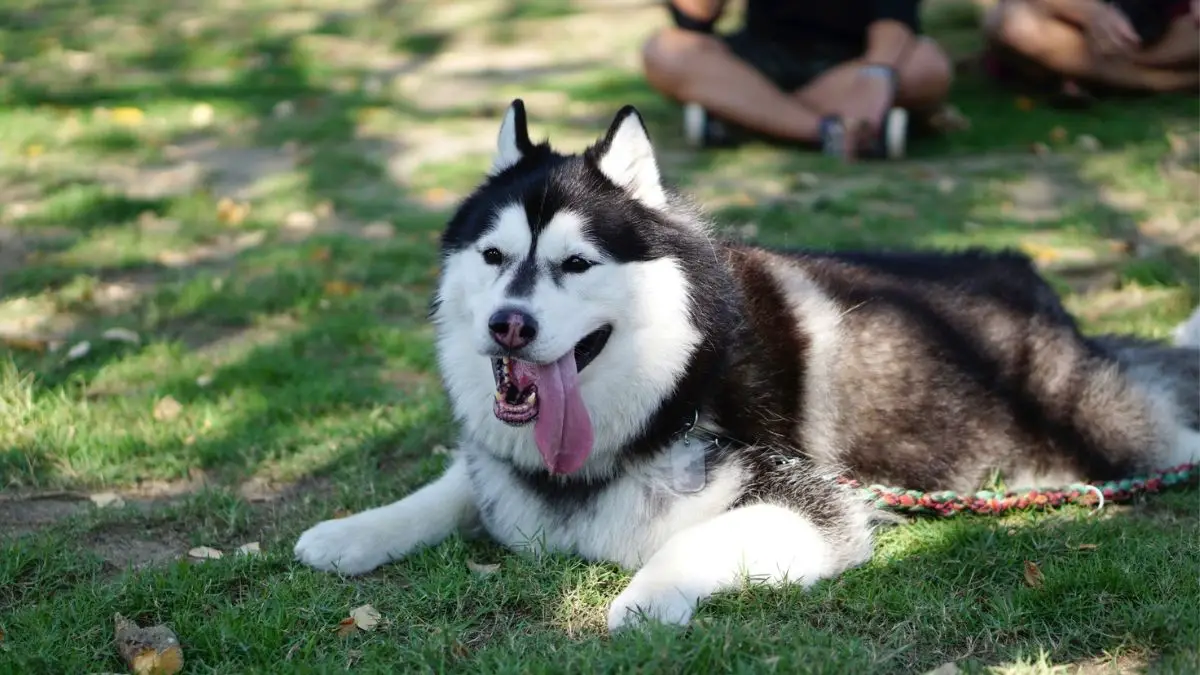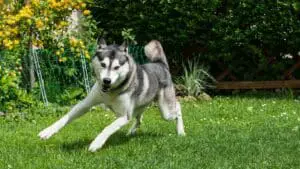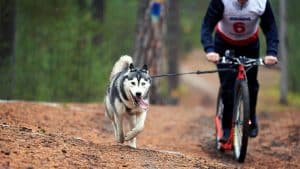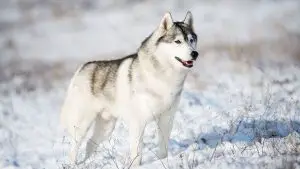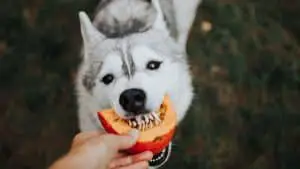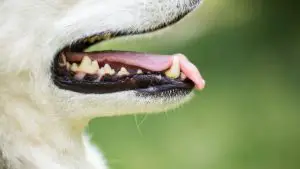Huskies & Overweight: 5 Things You Should Know
If you want to adopt a Husky or already own one, there are a few things you need to know. One of these things is their size. This factor plays a critical role as it helps determine the amount of food and exercise they require.
However, there is a chance that the owner might overfeed the dog in some cases, which results in obesity. A recent study in America revealed that 1 in every three dogs is overweight.
So, if you have done this and found your Husky to be overweight, you might wonder, are there solutions to canine obesity? If so, what are they? Lucky for you, this problem has more than just one solution!
Hence, if you are curious to find out what can be done to bring your dog down to the correct size, read this article!
Without further ado, let’s get started.
Table of Contents
Why is Your Pet Husky Gaining Weight?
There can be plenty of reasons as to why your Husky has started gaining extra weight. However, the most common cause has to be extra carbs. Canine obesity works the same way human obesity works as well.
So when your fat Husky’s meals consist of large portions of carbohydrates rather than proteins, vitamins, and other components, your dog will start gaining weight.
In addition to that, you may also be rewarding your pet Husky with many delicious treats. The process of gaining weight is so much faster when the dog does not have regular exercise. If the amount of calories consumed is greater than the amount of activity they get, it is only a matter of time before they become chunky and fluffy.
However, certain diseases can also make your pet Husky gain extra weight. For example, if your dog has gonadectomy or Cushing’s disease, there’s a good chance your dog will put on a little extra pounds.
Age also plays a vital role here. Usually, younger dogs are more active, and they release their energy by playing with their owners. However, older dogs become less active and spend half the time sleeping/lying down. This could also result in obesity.
How Do I Check If My Husky Is Overweight?
A fat Husky might not always look fat, and you cannot always rely on their weight alone to check if they are obese.
As mentioned earlier, one way to tell if your pet Husky is overweight is by running your hands over their ribcage (their sides). In a healthy dog, you will be able to feel the ribs. However, if your dog is overweight, this might not be the case.
Another way to tell if your Husky is overweight is by observation method. Take a look at their belly and see if there is any excess abdominal fat. A healthy dog usually has a good “waistline” where they do not have excess fat.
These are some indicators that you can try out if you want to find out whether your Husky is overweight or not.
What Is The Ideal Weight For A Husky?
Most people make one common mistake to look at the dog’s outward appearance to determine its health. Checking their weight is the first step to determining whether the dog is overweight, but running by actual numbers might also help.
Let’s take a look at the weights of female and male Huskies at different ages to help you keep track of their weight.
Average Weight Chart For Female Huskies
| Age | Weight in lbs | Height in inches |
| 2 months to 4 months | 10 lbs to 25 lbs | 10 inches to 12 inches |
| 4 months to 6 months | 25 lbs to 38 lbs | 12 inches to 14 inches |
| 6 months to 8 months | 38 lbs to 46 lbs | 14 inches to 16 inches |
| 8 months to 10 months | 46 lbs to 50 lbs | 16 inches to 18 inches |
| 10 months to 12 months | 50 lbs to 55 lbs | 18 inches to 20 inches |
| 1 year and above | 55 lbs and above | 20 inches to 22 inches |
Average Weight Chart For Male Huskies
| Age | Weight in lbs | Height in inches |
| 2 months to 4 months | 10 lbs to 25 lbs | 10 inches to 12 inches |
| 4 months to 6 months | 25 lbs to 40 lbs | 12 inches to 15 inches |
| 6 months to 8 months | 40 lbs to 50 lbs | 15 inches to 19 inches |
| 8 months to 10 months | 50 lbs to 55 lbs | 19 inches to 22 inches |
| 10 months to 12 months | 55 lbs to 60 lbs | 22 inches to 24 inches |
| 1 year and above | 60 lbs and above | 24 inches |
How To Control Canine Obesity?
Huskies tend to gain a lot of weight quickly when they are overfed. A lack of physical exercise often combines with overeating and can speed up the process of obesity.
A study recently revealed how the lifespan of overweight dogs drastically decreases by over 2 or 2 and a half years. This is incredibly tragic, especially because most people consider their canine companions as family.
This is why it’s essential to address the issue and bring it under control as soon as possible.
Listed below are a few effective methods you can use to bring down your fat Husky’s weight and bring it down to their average body weight.
Tip 1 – Hold Back The Calories
As mentioned earlier, 1 in every three dogs is overweight in America. There is a possibility that your Husky is one among them!
An increased calorie intake can quickly make your dog gain a lot of weight. Not only does this bring in canine obesity, but it also brings other problems like heart diseases, arthritis, and so on. Excess weight can also drastically decrease the overall lifespan of your puppy.
The first step to avoiding canine obesity is to decrease the number of carbs your dog eats. However, Huskies do require a certain amount of carbohydrates. But do not exceed the limit.
Overfeeding your dog with carbs, especially if your dog is older or has not been spayed, can quickly put on weight. That’s why you should stick to the recommended amounts of carbs for your dog.
If you need help finding out the recommended amount, it is best to consult your doctor.
Tip 2 – Measure Their Meals
You may think this is an effective way to control your dog, but that is not true. Giving your dog food whenever they start whining or creating a tantrum is a huge NO. This only helps add to the weight.
Measuring your Husky’s food before giving it to them can be a great way to control their intake. To correctly measure their meals, you can use a measuring cup. Keep in mind to follow and stay within the recommended amounts given by your doctor!
Tip 3 – Consider A Weight-Loss Plan
If your Husky is extremely plump and heavy, you might want to consider putting them on a weight loss plan. But before you implement this, run it by your vet to make sure it is safe.
That said, do not put them on strict, rigid diets either. Keep in mind that weight loss is not something that will happen overnight. It requires a lot of time and patience.
After a while of keeping your fat Husky on a diet, you will notice that your dog looks bright and healthy. So, give them some time and appreciate them with a whole lot of love and cuddles!
Tip 4 – Exercise Is The Key
If you want your Husky to be both happy and healthy, exercising is the answer. You might be your Husky’s best friend, but exercise is also an important partner.
Your Husky does not always require a very rigorous exercise session. You will be delighted to know that even 2 hours of physical exercise every day goes a long way.
You can take them out for a walk when you go for a jog or even have them run with you! Not only will this keep your pet in good shape, but it will also make for a great bonding experience.
Tip 5 – Be Mindful Of The Treats
It’s true when they say, “Too much of anything will kill you.” The same applies to dogs and their treats.
Giving your dog way too many treats can lead to canine obesity. Usually, the owners give their dogs these delicious treats when they are too fussy. Treats help calm them down and control them.
While this may be an excellent way to train them, overfeeding them with treats can lead to obesity.
Using treats that are low in carbohydrates and sugar will avoid canine obesity. You can find these at stores or even make them at home!
When Should You Take Your Husky To The Vet?
When you have your vet’s verdict on specific issues, you will feel more confident and handle the situation better.
You may think your question is irrelevant, but your vet won’t. So, do not hesitate to contact the vet at any point!
Summing Up
Gaining weight is a lot easier than losing weight. This is why managing your fat Husky’s weight can be quite a challenging task.
But keep in mind that it is challenging, not impossible.
Weight loss, even in dogs, is not the kind of process that happens magically overnight. It requires a lot of practice and patience. Following the tips mentioned in this article will further help in quickly bringing down your Husky’s weight.
So, keep hustling and don’t give up!

